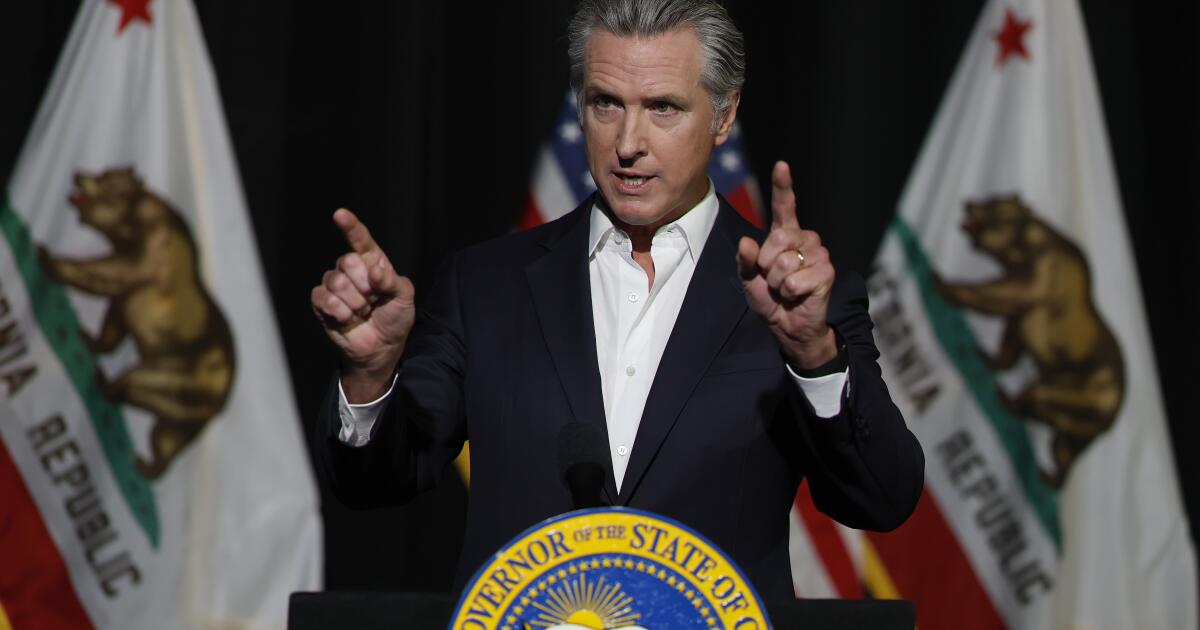Copyright Los Angeles Times

California’s tech companies, the epicenter of the state’s economy, sent politicians a loud message this year: Back down from restrictive artificial intelligence regulation or they’ll leave. The tactic appeared to have worked, activists said, because some politicians weakened or scrapped guardrails to mitigate AI’s biggest risks. California Gov. Gavin Newsom rejected a bill aimed at making companion chatbots safer for children after the tech industry fought it. In his veto message, the governor raised concerns about placing broad limits on AI, which has sparked a massive investment spree and created new billionaires overnight around the San Francisco Bay Area. Assembly Bill 1064 would have barred companion chatbot operators from making these AI systems available to minors unless the chatbots weren’t “foreseeably capable” of certain conduct, including encouraging a child to engage in self-harm. Newsom said he supported the goal, but feared it would unintentionally bar minors from using AI tools and learning how to use technology safely. “We cannot prepare our youth for a future where AI is ubiquitous by preventing their use of these tools altogether,” he wrote in his veto message. The bill’s veto was a blow to child safety advocates who had pushed it through the state Legislature and a win for tech industry groups that fought it. In social media ads, groups such as TechNet had urged the public to tell the governor to veto the bill because it would harm innovation and lead to students falling behind in school. Organizations trying to rein in the world’s largest tech companies as they advance the powerful technology say the tech industry has become more empowered at the national and state levels. Meta, Google, OpenAI, Apple and other major tech companies have strengthened their relationships with the Trump administration. Companies are funding new organizations and political action committees to push back against state AI policy while pouring money into lobbying. In Sacramento, AI companies have lobbied behind the scenes for more freedom. California’s massive pool of engineering talent, tech investors and companies make it an attractive place for the tech industry, but companies are letting policymakers know that other states are also interested in attracting those investments and jobs. Big Tech is particularly sensitive to regulations in the Golden State because so many companies are headquartered there and must abide by its rules. “We believe California can strike a better balance between protecting consumers and enabling responsible technological growth,” Robert Boykin, TechNet’s executive director for California and the Southwest, said in a statement. Common Sense Media founder and Chief Executive Jim Steyer said tech lobbyists put tremendous pressure on Newsom to veto AB 1064. Common Sense Media, a nonprofit that rates and reviews technology and entertainment for families, sponsored the bill. “They threaten to hurt the economy of California,” he said. “That’s the basic message from the tech companies.” Advertising is among the tactics tech companies with deep pockets use to convince politicians to kill or weaken legislation. Even if the governor signs a bill, companies have at times sued to block new laws from taking effect. “If you’re really trying to do something bold with tech policy, you have to jump over a lot of hurdles,” said David Evan Harris, senior policy advisor at the California Initiative for Technology and Democracy, which supported AB 1064. The group focuses on finding state-level solutions to threats that AI, disinformation and emerging technologies pose to democracy. Tech companies have threatened to move their headquarters and jobs to other states or countries, a risk looming over politicians and regulators. The California Chamber of Commerce, a broad-based business advocacy group that includes tech giants, launched a campaign this year that warned over-regulation could stifle innovation and hinder California. “Making competition harder could cause California companies to expand elsewhere, costing the state’s economy billions,” the group said on its website. From January to September, the California Chamber of Commerce spent $11.48 million lobbying California lawmakers and regulators on a variety of bills, filings to the California secretary of state show. During that period, Meta spent $4.13 million. A lobbying disclosure report shows that Meta paid the California Chamber of Commerce $3.1 million, making up the bulk of their spending. Google, which also paid TechNet and the California Chamber of Commerce, spent $2.39 million. Amazon, Uber, DoorDash and other tech companies spent more than $1 million each. TechNet spent around $800,000. The threat that California companies could move away has caught the attention of some politicians. California Atty. Gen. Rob Bonta, who has investigated tech companies over child safety concerns, indicated that despite initial concern, his office wouldn’t oppose ChatGPT maker OpenAI’s restructuring plans. The new structure gives OpenAI’s nonprofit parent a stake in its for-profit public benefit corporation and clears the way for OpenAI to list its shares. Bonta blessed the restructuring partly because of OpenAI’s pledge to stay in the state. “Safety will be prioritized, as well as a commitment that OpenAI will remain right here in California,” he said in a statement last week. The AG’s office, which supervises charitable trusts and ensures these assets are used for public benefit, had been investigating OpenAI’s restructuring plan over the last year and a half. OpenAI Chief Executive Sam Altman said he’s glad to stay in California. “California is my home, and I love it here, and when I talked to Attorney General Bonta two weeks ago I made clear that we were not going to do what those other companies do and threaten to leave if sued,” he posted on X. Critics — which included some tech leaders such as Elon Musk, Meta and former OpenAI executives as well as nonprofits and foundations — have raised concerns about OpenAI’s restructuring plan. Some warned it would allow startups to exploit charitable tax exemptions and let OpenAI prioritize financial gain over public good. Lawmakers and advocacy groups say it’s been a mixed year for tech regulation. The governor signed Assembly Bill 56, which requires platforms to display labels for minors that warn about social media’s mental health harms. Another piece of signed legislation, Senate Bill 53, aims to make AI developers more transparent about safety risks and offers more whistleblower protections. The governor also signed a bill that requires chatbot operators to have procedures to prevent the production of suicide or self-harm content. But advocacy groups, including Common Sense Media, removed their support for Senate Bill 243 because they said the tech industry pushed for changes that weakened its protections. Newsom vetoed other legislation that the tech industry opposed, including Senate Bill 7, which requires employers to notify workers before deploying an “automated decision system” in hiring, promotions and other employment decisions. Called the “No Robo Bosses Act,” the legislation didn’t clear the governor, who thought it was too broad. “A lot of nuance was demonstrated in the lawmaking process about the balance between ensuring meaningful protections while also encouraging innovation,” said Julia Powles, a professor and executive director of the UCLA Institute for Technology, Law & Policy. The battle over AI safety is far from over. Assemblymember Rebecca Bauer-Kahan (D-Orinda), who co-wrote AB 1064, said she plans to revive the legislation. Child safety is an issue that both Democrats and Republicans are examining after parents sued AI companies such as OpenAI and Character.AI for allegedly contributing to their children’s suicides. “The harm that these chatbots are causing feels so fast and furious, public and real that I thought we would have a different outcome,” Bauer-Kahan said. “It’s always fascinating to me when the outcome of policy feels to be disconnected from what I believe the public wants.” Steyer from Common Sense Media said a new ballot initiative includes the AI safety protections that Newsom vetoed. “That was a setback, but not an overall defeat,” he said about the veto of AB 1064. “This is a David and Goliath situation, and we are David.”



